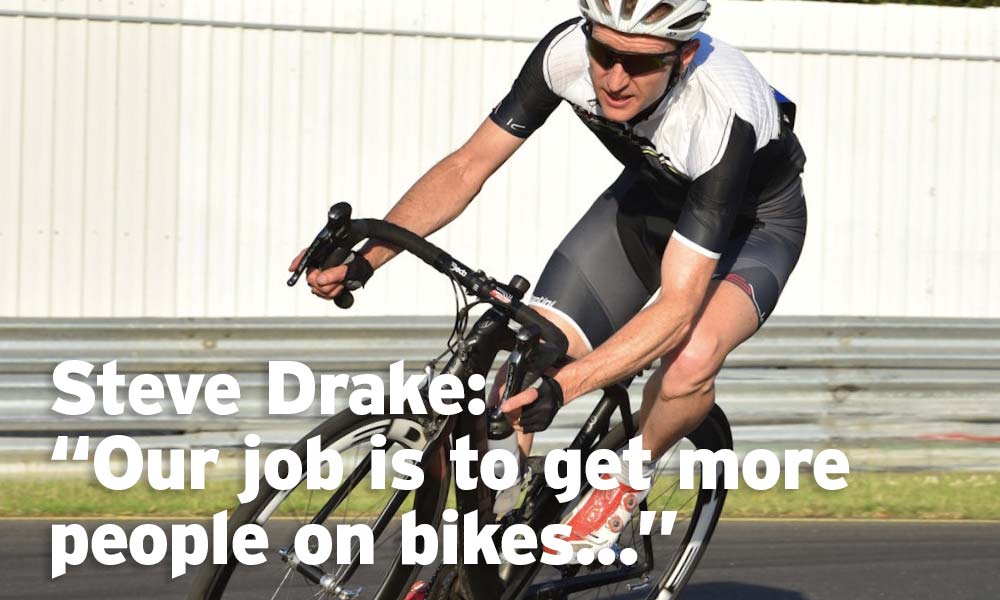[et_pb_section bb_built=”1″ admin_label=”section”][et_pb_row admin_label=”row”][et_pb_column type=”1_4″][et_pb_text background_layout=”light” use_border_color=”off” border_color=”#ffffff” border_style=”solid” _builder_version=”3.0.93″]
There’s a new CEO at Cycling Australia. Steve Drake hit the ground running in February and he’s optimistic about what the future holds.
Photo: courtesy of Carnegie Caufield CC
[/et_pb_text][/et_pb_column][et_pb_column type=”3_4″][et_pb_text background_layout=”light” use_border_color=”off” border_color=”#ffffff” border_style=”solid” _builder_version=”3.0.93″]
Earlier this year it was announced that former Australian road race champion, Steve Drake, would take over the role of Cycling Australia CEO. His predecessor was Olympic rower, Nick Green, who held the position during a turbulent time for cycling in Australia. There was debt to manage and, despite the glut of interest in riding, it didn’t necessarily translate to more people racing.
Cycling Australia’s remit is a broad one but ultimately it is charged with the task of managing the sporting element of cycling.
Drake met with RIDE Media on the second day of his tenure as CEO. We discussed a range of topics in an off-the-record discussion that took into consideration some strong criticism levelled at Green and his administration.
The 48-year-old will join other National Sporting Organisation (NSO) delegates from around country on Friday in Sydney (27 April). The Australian Sports Commission is hosting a function that serves to consider how sport is managed and what strategies may be employed in the future to ensure a healthier, more active society.
* * * * *
– You can find the full transcript of the interview here. –
* * * * *
“We won’t be the sole cause – or sole mitigant – to the obesity issue,” said Drake during a long discussion about a broad range of topics, “but I certainly think that cycling has got a role to play. It is an activity that can be a whole-of-life thing.”
This comment came in response to a suggestion that one of Cycling Australia’s ideals should be to get more people riding; as a consequence of that, it’s likely that the nation will continue to achieve good results in races on the world stage.
Cycling, as Drake acknowledges, is about much more than sport alone and he hopes that government policy will soon evolve to include funding to drive participation rather than the current focus of trying to win Olympic gold medals.
“I think the government should be mindful of doing all it can in a preventative way to minimise long-term healthcare costs,” said Drake. “Otherwise, at some point, things are going to get pretty ugly.”
No CEO of any NSO can ensure that a nation has a more active community, but the cycling administrators can have a role to play in encouraging exercise – and do so with a means that also serves other functions, including transport. As Drake said at the end of his interview with RIDE Media, “you can’t exactly swim to school”.
Bike riding, however, could become more popular if policy was created to encourage participation and conditions were safer for everyone who wants to ride.
“What I’d love to be able to do in conjunction with a commercial sponsor is dramatically expand our participation programs so we’re getting more kids on bikes,” said Drake. “That comes back to what we were talking about… the purpose of CA. I think our job is to get more people on bikes.”
As a racer, Steve Drake was a road cyclist. He recently returned from a European adventure booked over a year ago as part of a friend’s 50th birthday celebrations. The Aussie mates went to Belgium and France and rode their bikes. The CEO of CA contested the 140km ‘sportif’ ride on the route of the Tour of Flanders one weekend; the next Saturday he set off from the Forest of Arenberg and rode the celebrated road – pavéand all – of Paris-Roubaix all the way to the velodrome.
He returned to Australia in time to see some of the events at the recent Commonwealth Games and celebrate a successful campaign for the recently renamed Australian Cycling Team.
Drake competed in the road race Commonwealth Games in 1994. He was once a scholarship holder for the AIS road cycling program.
He took a hiatus from the sport, focussing on a career in banking while living abroad. But he’s back “home”, back on the bike, and enjoying the challenges that are coming his way.
The father of two has a vision to get more people riding, he believes that children are a big part of the future for his sport, and although he admits that there won’t be any immediate changes to Cycling Australia’s approach to high performance sport, there’s broad scope for what is possible for the activity of bike riding…
“I think that most people who end up being members of CA do it because they love riding,” he says. “Some are very competitive but many just love riding.”
The current membership of Cycling Australia is a tally of around 27,000 but Drake believes that this can increase significantly with proper management, bold initiatives, and a focus on providing better engagement for bike riders of all abilities.
“I think if we can educate people better about the benefits of membership and we can improve the value of our membership then it will almost be self-fulfilling – the word will get around, people will go, ‘Okay, this is an organisation that’s worth joining.’”
– By Rob Arnold
[/et_pb_text][/et_pb_column][/et_pb_row][/et_pb_section]



